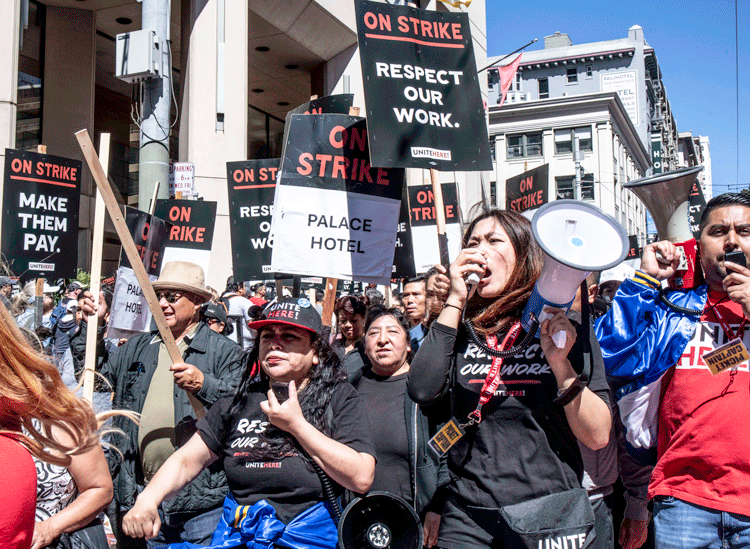The falling birth rate and rising obstacles workers face to being able to afford to raise children have become key issues in the 2024 presidential campaign. Decades of employer attacks on wages and working conditions have made starting a family much more difficult for workers and produced conditions that reinforce the second-class status of women under capitalism.
Union struggles today point to workers’ willingness to fight what is being done to us. Strikes and contract fights by flight attendants, rail, hotel, AT&T and longshore workers are demanding jobs, wages and protection against high prices to permit workers to pay for food, gas, housing, medical care, child care and other necessities. They’re standing up to bosses’ attempts to impose life-draining schedules, forced overtime and other obstacles to family, union and political life. And they advance the road forward for women’s emancipation.
The U.S. birth rate in 2023 was 1.62 births per woman, down from 3.65 in 1960, and below the rate required to maintain the population.
Capitalist pundits who used to write articles warning of the dangers of “overpopulation,” now sound alarms about the “increasing burden of too many old people.” Their real concern is that with fewer young, healthy workers the capitalist class can’t count on a sufficient supply of labor to exploit.
As this question has become more prominent, both capitalist candidates, Kamala Harris and Donald Trump, have put forward various proposals for boosting tax credits for having children, schemas that are supposed to soften the blows coming down on workers with families.
These proposals do nothing to address the real source of the problem, the bosses’ attacks on workers, rising prices and a capitalist government that puts the burden of raising a family on working people and especially on women. Growing numbers of workers and their families are just a few paychecks away from homelessness.
The average cost of childbirth today is $18,865. For those with insurance, the average off-the-top expense is $2,854. Feeding a hungry newborn can set you back $50 for a can of baby formula at Walmart. A box of Pampers is $35. When you add these to the persistently high cost of rent, food, transportation and child care, is it any wonder young workers have doubts about raising a family or that women are putting off decisions about whether to have children?
Liberals, like Democratic Party candidate Kamala Harris, who are sympathetic to middle-class women who see children as an obstacle to their career path, act as if the solution to all this is abortion.
Fight for women’s emancipation
Alongside their drive against the wages and conditions of all workers, bosses rely on the second-class status of women to boost profits. In recent decades millions of women have flooded into the workforce, transforming and advancing the strength of the working class and the potential for the struggle for women’s emancipation.
But today women working full time still take home on average only 83.6% of what men are paid. Women make up 55% of all part-time workers, often in jobs with less pay and fewer benefits. Many are forced to take part-time work because of the exorbitant costs of child care and the responsibilities under capitalism that fall on women’s shoulders for the care of the young, elderly, sick and disabled.
Rachele Fruit, the Socialist Workers Party candidate for president, points to the need for workers to take political power into our own hands, to build a party of labor that would organize all working people into struggles for the class interests of both men and women along this course.
Such a party would fight for a massive, federally funded jobs program to put millions to work at union-scale pay, for wage and benefit adjustments so that every time prices rise our wages go up automatically, and for universal child care, as well as access to sex education, safe and reliable contraception, prenatal and maternal health care. It would unconditionally back the decriminalization of abortion and win others to fighting for this.
These steps would help address both the struggles of the working class and the fight for women’s rights.
Liberals are pushing amendments to “enshrine” abortion in state constitutions in Arizona, Missouri, Montana, Nebraska and elsewhere in November. Their goal is to cut off the discussion and debate in the working class that is needed on this question in order to deepen support for the rights of women. They portray access to abortion as the main solution to the crisis facing women.
Fruit, a union hotel worker in Miami and lifelong fighter for women’s rights, and her running mate, Dennis Richter, fight for decriminalization of abortion and for conditions that make it possible for women to choose to have children and raise them.
At issue is the potential for human life, they explain. Terminating a pregnancy is a fallback, something needed when other things fail. This is why it should be decriminalized. Contrary to being something that is “enshrined,” as supporters of these referenda propose, we need to fight to make abortion rarer. This is something that can only be advanced by the working class, as it organizes to end forever the wretched social conditions that have led to its widespread use.
That is only possible with the building of a working-class movement of millions to replace capitalist rule with workers power. In the course of revolutionary struggle, workers acquire confidence and a sense of worth. And we open the door to building a new society where women’s emancipation can become a reality and where babies are welcomed and cherished.


